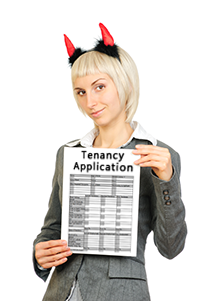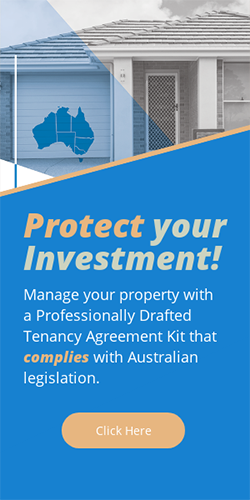If you have a vacant investment property that’s starting to cost you money then you may be tempted to grab the first prospective tenant that walks through your door. But if that tenant is a bad tenant then you are only trading one problem for another which might cost you far more than just a couple of rental payments.
A bad tenant can potentially cause you all sorts of stress – emotional and financial – and is a difficult problem to solve once the tenant is entrenched on your premises.
Choosing a tenant
When you’re evaluating a prospective tenant you should research them thoroughly. Credit checks and employment checks are a must, but pick up the phone and speak with employers and past landlords or agents. They can help you to accurately assess potential tenants and weed out bad ones.

It’s rarely this easy to spot a bad tenant so you need to do thorough background checks and follow your gut instinct.
Don’t rely on just the written word or tenant registries. A friend of mine got stung very badly when her real estate chose a tenant from hell. After she signed the tenancy lease and spoke to a few people around our small town, she found out that the tenant was quite notorious yet her agent was fooled. The tenant trashed her house and treated it like a junk yard. It was highly stressful, expensive and there was little she could do about it because she had signed the lease. It didn’t matter that the agent had chosen poorly – in the end the owner had to deal with the stress of the situation.
So take the time to pick up the phone – it could well save you. Similarly don’t underestimate your intuition – if you meet a prospective tenant and something doesn’t feel right, don’t proceed.
And one more sneaky tip – how do they treat their car? if you get the chance, check out the interior of their car. If it looks like a garbage dump it could be a warning sign.
Before they move in
Put your lease agreement in writing and specify any special conditions such as maximum number of occupants, whether pets are allowed and if so, any additional requirements on the tenant, etc.
After they have moved in
Once your tenant has moved in, it’s smart to keep an active eye on how they’re going. You should:
- Inspect your property frequently.
- Monitor rent payments.
- Attend to repairs promptly.
- Resolve breaches of your lease promptly – do not wait to see if breaches will fix themselves over time.
It doesn’t matter whether your managing the property yourself or an agent is doing it for you – don’t just rent and forget. Make the effort to know what is going on with your property on a regular basis.
What if your tenant is growing horns?
If you suspect that your tenant may be going to the dark side then taking prompt action is key. At this stage it’s all about crises management and doing the right thing at the right time.
If you’re unfortunate to house a repeat offender then you’re probably dealing with someone who is very familiar with their rights and knows how to bend the rules to their advantage. This means you have to be diligent and persistent.
Late payments
If your tenant starts missing rent payments and soon falls behind in rent, they could end up costing you a lot of money if you don’t take swift action.
You can’t take action to evict a tenant for unpaid rent of less than 14 days. However, we encourage landlords to actively monitor rent payments and give a reminder by phone, email, text message or mail, where payment has not been received for the current payment period. It will send your tenant the message that you are on top of payments and that you will act quickly on unpaid rent.
The eviction process takes time – beginning with the obligatory notices and ending with the tenant vacating the property. Overdue rent can quickly snowball during this period, so it is imperative that you begin the eviction process as soon as you become aware that the tenant is at least 14 days behind. This will help to lessen the accumulation of overdue rent.
Letting the property degrade into a state of disrepair and damage
Failure to adequately care for and maintain the premises means the property can quickly fall into a state of disrepair and damage. This issue can escalate quickly and result in substantial cost to the landlord.
Regular inspections can help keep on top of this situation. A tenant is under an obligation to keep the rented premises in a good state of repair and in a similar condition as when they took possession of the premises (fair wear and tear excepted). Further, tenants have a duty to notify the landlord of any damages, so that they can be rectified promptly.
Cleanliness
Similarly, a failure to keep the premises clean can result in damage to the property and a catalyst for the invasion of cockroaches, rodents and other pests. Again, regular inspections can help to keep on top of the condition of your property. A tenant is under an obligation to keep the home in a clean and tidy condition.
Pets
Having pets (whether allowed by the landlord or not) requires a lot of extra work on the part of the tenant. Pets can wreak havoc to the yard and interior of the home if not cared for properly and proper hygiene, cleaning practices and training is not carried out by pet owners.
Some states may allow you to take a higher bond where pets are being kept at the premises and you can require the tenant to professionally clean the carpet at the end of the tenancy and/or have the property sprayed for pests. You should clarify any such obligations in your lease and make your tenant aware of these additional obligations before they commit to the lease.
Again, monitoring the property by way of regular inspections can help to minimise any damages.
Make sure that you carry out a thorough inspection at the end of the lease as you may be entitled draw on the security bond to repair damage to the property caused by pets, such as replacing damaged carpets.
Noise and nuisance
Problem tenants can creating excessive noise and create a disturbance to the neighbours.
Your tenant must not cause or permit nuisance, or interfere with the reasonable peace, comfort or privacy of their neighbours. If they do so, particularly if they do so consistently and have ignored requests and warnings to stop, they can be evicted. If you also own the neighbouring apartments or flats, you will have a positive duty to the neighbouring tenants to ensure that they have peace and quiet enjoyment of their premises. This may mean you need to resort to eviction of the offending tenant.
Multiple persons living on premises not listed on the lease
You rent your premises to a couple, but it soon becomes clear that every relative and friend has moved in with them.
Your lease should designate the number of people that may reside in the property. If the number of tenants exceeds that allowed, you can ask that move out or terminate the lease for breach of lease if they don’t.
Drug use and criminal activity
This is high risk activity that can damage and devalue of your property. You have the right to end the lease early if your tenant uses your premises for an illegal use. An example is using the premises for the manufacture of drugs or the sale, cultivation or supply of drugs. Give-aways for illegal activities taking place at your premises include high traffic of visitors and cars throughout the day or night with complaints by neighbours and is often accompanied by other types of undesirable behaviours listed here.
Again, the value of undertaking proper background checks on the tenant (including credit checks) and regularly inspecting your property cannot be overstated. It would also be worth getting to know the neighbours and giving them your contact details, as they can act as your eyes and ears and keep you informed about any undesirable activities at your property they become aware of.
Domestic violence
Domestic violence is on the rise and it’s not only a tragedy for the people involved, but it also may have a negative impact on your property. Your lease may be ended early if a tenant has an AVO taken out against them, prohibiting them from entering the premises.
Tenancy laws in NSW and other states have recently been changed to deal more compassionately with domestic violence issues. See Domestic Violence and Tenancies in NSW.
If you are experiencing domestic violence (or know of somebody who is), help is available. Call the domestic violence hotline or the police.
Conclusion
By implementing safeguards and procedures, you can greatly maximise the protection of your investment property and help to avoid the problems of a bad tenant.
Do you need more information?
Alterations to rental properties – do’s and dont’s

